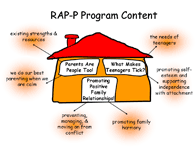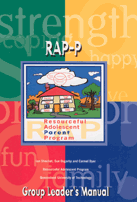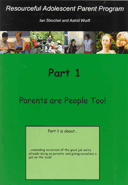The Resourceful Adolescent Parent Program (RAP-P)
Why do we need a RAP-P program?
Family factors are known to relate to depression and suicide in adolescents. Overall, the quality of parent-adolescent relationships, and the presence of family conflict are reliable predictors of adolescent depression. Conflict, and particularly escalating conflict with parents, and expression of parental over-control are well-established risk factors for adolescent depression. Alternatively, strong parental attachments and expressions of warmth and caring have been found to buffer adolescents from depression.
 The RAP Parent program (RAP-P) was developed to help parents promote the optimal family environment for healthy adolescent development.
The RAP Parent program (RAP-P) was developed to help parents promote the optimal family environment for healthy adolescent development.
RAP-P, like RAP-A, is a competency based program which aims to help parents boost their own self esteem and the self-esteem of their adolescents. RAP-P also helps parents to manage their negative emotional overreactions to their adolescents and their adolescents' emotional overreactions to them.
The Resourceful Adolescent Program for Parents (RAP-P) involves three parent sessions, each of between two and three hour's duration. The program could also be offered as a daylong workshop. Another alternative is to break the sessions up into smaller sessions and run 5/6 workshops.
Program content
The program has three major themes, each with a key message and specific aims.
Click here to see a table showing the titles and main aims of each of the sessions in the RAP-P Program.
Parents Are People Too: Parents are encouraged to focus on their existing strengths, and to recognise their contribution to their adolescent's wellbeing. They also identify the impact of stress on effective parenting, and ways of managing their stress.
 What Makes Adolescents Tick: Parents are encouraged to consider the specific needs of adolescents. They are facilitated to discuss adolescent development and role transitions pertinent to this age group (e.g., the dilemma of balancing the need for nurturance and protectiveness, with the desire for growing independence). Specific techniques to help parents bolster an adolescent's self-esteem are covered.
What Makes Adolescents Tick: Parents are encouraged to consider the specific needs of adolescents. They are facilitated to discuss adolescent development and role transitions pertinent to this age group (e.g., the dilemma of balancing the need for nurturance and protectiveness, with the desire for growing independence). Specific techniques to help parents bolster an adolescent's self-esteem are covered.
Promoting Family Harmony: Parents focus on the process of promoting harmonious family relationships and on the prevention and management of severe conflict.
In the RAP-P program facilitators do not present themselves as “experts". Rather, group leaders take the role of collaborator with the parents. Group leaders need to use some level of self-disclosure and appropriate self-deprecation with regard to their own parenting or their experiences of being parented in order to join the parents in a very real and human fashion. To increase the collaborative process between group leader and parents during the program, all examples are written in inclusive language (we, our, us) rather than exclusive language (you, our).
Implementing the program
The role of group leader is critical to the effectiveness of the RAP program. Group leaders need to be educational or mental health workers with specific training in the facilitation of RAP-P groups. The following people may be suitable for facilitating the RAP-P program.
- Psychologists/ Social workers / Occupational therapists / Psychiatrists / Mental Health Nurses
- School counsellors/ Guidance officers/Chaplains
- Teachers
- Community workers
Training events are offered at regular intervals in Brisbane and Sydney, and throughout Australia on request.. Some training courses are also run in Europe. See Training for details of upcoming courses.
The RAP team travels to alternative locations to provide training. To date, the team has travelled to all Australian states and territories, as well as to New Zealand to provide training. See Training for information on how to access training.
Group participants and size
The RAP program has been designed for parents of adolescents. It has been found to work particularly well with the parents of year seven (12 year olds) and eight parents.
It is suggested that a group size of twelve to sixteen parents is most effective when implementing the RAP program, as there is a lot of material to cover in limited time. A smaller group also allows for the group to bond and share material in a safe environment.
RAP-P resources
 RAP-P group leader's manual
RAP-P group leader's manual
The RAP-P Group Leader's Manual describes a number of interventions for parents that are designed to assist them to navigate their children's adolescent years with increased family closeness and reduced conflict. The RAP Parent Group Leader's Manual provides information about the content of each session and how to conduct activities to demonstrate the concepts being introduced.
RAP-P participant workbook
This 59 Page workbook contains activities and information for parents who complete the Resourceful Adolescent Program for Parents. The booklet is designed for parents to write down their thoughts, and becomes a take home resource. A Participant Workbook must be provided to each participant.
Supplementary DVD
With the purchase of a RAP-A or RAP-P Group Leader Manual, a Supplementary DVD is provided. This DVD provides supplementary material to be used in activities throughout the programs.
 The Resourceful Adolescent Parent Program: StandAlone Workbooks
The Resourceful Adolescent Parent Program: StandAlone Workbooks
This is a series of six workbooks that allow parents to work through the RAP Program at their own pace in their own home. Parents engaged well and rated the program highly.
The Indigenous Parent Program (group leader manual and video)
The RAP-P has been adapted for use in indigenous communities. This program does not require a participant workbook; rather it uses a video to stimulate discussion.
Sessions, key messages, & outlines for the Resourceful Adolescent Parent Program
Session | Key Message | Aims |
Parents are People Too! | Parents do a great job and deserve a pat on the back | To discuss parenting successes, struggles and trying to cope as parents. To build parental self-esteem To understand how stress affects us as parents and discuss ways of managing our stress |
What Makes Teenagers Tick | Parents are important in supporting teenage development. | To explore important teenage issues of identity, self-esteem and independence with attachment. To identify ways parents can boost teenagers’ self-esteem. To identify ways that parents can help their teenagers navigate their teenage time safely and positively by supporting independence with attachment. |
Promoting Positive Family Relationships! | Positive family relationships increase self-esteem and wellbeing for all. | To share issues seen differently by teenagers and parents. To find positive ways to prevent, manage and move on from family conflict. To help parents find a support network. To encourage positive parent outlook for the future. |
 Resourceful Adolescent Program
Resourceful Adolescent Program